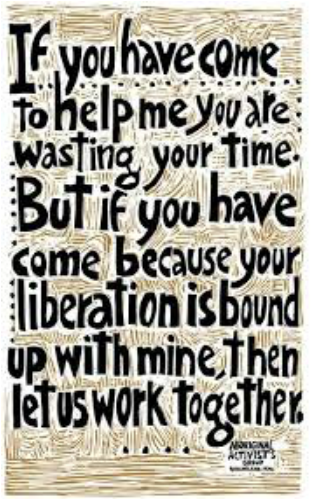|
By: Xeres Villanueva  When imperialism, alienation and subjugation crept in as a part of our everyday reality, it also became a struggle for average people to relate to each other in ways that are life-giving, just and mutual. Many modern societies and cultures are structured to reinforce the unjust relationships and community dynamics that often require one to put down others to lift oneself or someone else up. In other words, people are conditioned to take away someone else’s power to themselves be empowered. For example: in the Hayti District in Durham, NC, urban renewal, suburbanization and highway development have fragmented and disempowered the once economically self-sufficient and independent black community. This phenomenon is widespread in urban centers where predominantly middle-class individuals daily commute into urban areas for work. Issues of traffic congestion are often solved by cutting thoroughfares through communities that are predominantly of color. This empowers those middle-class individuals who commute daily into the city to get to and from their places of work with relative ease, but is highly disempowering for the communities that are divided by these developments. Another unjust dynamic that often creeps in to our ways of relating as individuals and communities is a sense of noblesse oblige. Noblesse oblige can be defined as “the perceived responsibility of privileged people to act with generosity toward those less privileged than themselves,” and it is embodied in some aspects of short mission trip programs where mission trippers end up doing jobs and projects for the recipient communities rather than doing the projects alongside them as partners. This ultimately makes these trips about the service and good works of the participants rather than empowering the local people to make a difference in their own lives. In effect, these mission trips “carve a highway” (so to speak) across the recipient communities which brings power to mission participants (sates their consciouses/makes them feel like good Christians) while disempowering the receiving communities who often lose any sense of independence and self-determination. While it can be hard to imagine the possibilities of creating relationships and communities that are mutual and fight back against the enculturation of our disempowering and unhealthy culture of empire, many groups and individuals are willing to do the necessary work to understand the systems that oppress and work toward solidarity with one another. In a sense, this is a form of grace by the Holy Spirit. Many people today and before us have found ways to build coalitions, neighborhoods and communities of healing and resistance in the face of dehumanization and disempowerment. In my work as a volunteer staff of Tuesday Night Café, which is a free, Asian American run mic series, we often highlight various local organizations, businesses and groups that contribute to community building at some level. We have highlighted drug rehab programs, art collectives, other open mic spaces, social justice organizations, and so forth. We often develop deep friendships and collaborations with these people as well as with the artists whose performances we feature, and a variety of other people in our community. Throughout these experiences and others, I have come to understand that solidarity is about understanding that because we all suffer, we are all responsible for one another. It means advocating for each other in our suffering and our joy. It involves developing a peer to peer approach to coming along side a comrade and sharing emotional labor. But beyond this, solidarity needs to be done in conjunction with work towards dismantling the power dynamics which maintain suffering and oppression. Furthermore, solidarity means highlighting the voices and works of the oppressed, disempowered, and dispossessed among us. Solidarity is one of the tools we have to recreate more interdependent ways of relating and being amidst our culturally conditioned tendency to see only our own struggles, putting our needs over and above (and often at the behest of) our neighbors’. When trying to nurture solidarity, it is important to be reminded that all of us are conditioned to remain complicit in all systems of oppression and to maintain the status quo of unjust power dynamics, alienation, lovelessness and injustice. Therefore, it often takes some form of the “Road to Damascus” experience to realize these systems’ abusive and insidious nature and resist the temptation to bring down other’s callings, achievements, and sufferings as a means to center ones own. Within the biblical texts, there are a number of instructive moments of mutual solidarity which depict characters awake to the need for mutual liberation and solidarity. One such moment occurs between Mary and Elizabeth in Luke’s Gospel. The first chapter of Luke’s Gospel tells the story of the foretold birth of John the Baptist and Jesus. It also demonstrates how Mary and Elizabeth (as mothers of these prophesied figures) are interlinked in that moment, holding space for one another’s callings, joys and suffering. It first takes us on Elizabeth’s journey on her role in bringing in John the Baptist. She and Zechariah lived with the reality of being childless due to infertility until angel Gabriel announced that their prayers had been heard and that they will bring a child into the world. Next, it takes us to Mary’s journey as the mother of Christ. She was a young girl, engaged to be married when the angel Gabriel appeared before her to tell her that she was called to bear the Son of God. She accepted the call. When Mary came to Elizabeth’s house and greeted her in Luke 1:39, Elizabeth, filled with the Holy Spirit, declared Mary being blessed among women, and shared Mary’s joy. From there, Mary sang the Magnificat song. She stayed with Zechariah and Elizabeth for three months and then returned home. Throughout the narrative, the two women demonstrated great support to each other and their callings. Elizabeth recognized and acknowledged Mary’s calling to bring Christ into the world. Mary stayed with Elizabeth for three months to just be with her and support her. Both had marginalized identities and they exercised the art of holding space for one another by recognizing how God was moving in each other’s lives. Within this complicated social, spiritual and political reality, these women found a way to be with one another in joy and struggle. Similarly, we see in Jesus the practice of solidarity with his followers in a variety of circumstances. One example of this can be found in the story of the death and revival of Lazarus in John 11:1-44. Lazarus had just passed away. Jesus came down to Bethany to comfort Mary and Martha, the sisters of Lazarus. Jesus listened to Martha and Mary’s grief as they cried out “if you had been here, my brother would not have died.” As he saw them weeping and the other Jews came to them to comfort them, Jesus was so deeply moved and troubled that he asked “Where have you laid him?” And then Jesus wept. In this story, the sorrows of Martha and Mary are his own sorrows. The path to liberation must be walked collectively with communities of people who are willing to help each other to get there. The messiness and painful realities of power dynamics that have been imposed on us have made alliance and community building challenging and turbulent. This makes learning how to be in solidarity with others and creating just and compassionate ways of being that much more imperative. Creating the new society within the shell of the old happens as we learn how to justly and lovingly connect with oneself, God, one another, and all living things.
Comments
|
Disclaimer
The viewpoints expressed in each reader-submitted article are the authors own, and not an “official Jesus Radicals” position. For more on our editorial policies, visit our submissions page. If you want to contact an author or you have questions, suggestions, or concerns, please contact us. CategoriesAll Accountability Advent Anarchism Animal Liberation Anthropocentrism Appropriation Biblical Exegesis Book Reviews Bread Capitalism Catholic Worker Christmas Civilization Community Complicity Confessing Cultural Hegemony Decolonization Direct Action Easter Economics Feminism Heteropatriarchy Immigration Imperialism Intersectionality Jesus Justice Lent Liberation Theology Love Mutual Liberation Nation-state Nonviolence Occupy Othering Pacifisim Peace Pedagogies Of Liberation Police Privilege Property Queer Racism Resistance Resurrection Sexuality Solidarity Speciesism Spiritual Practices Technology Temptation Veganism Violence War What We're Reading On . . . White Supremacy Zionism ContributorsNekeisha Alayna Alexis
Amaryah Armstrong Autumn Brown HH Brownsmith Jarrod Cochran Chelsea Collonge Keith Hebden Ric Hudgens Liza Minno Bloom Jocelyn Perry Eda Ruhiye Uca Joanna Shenk Nichola Torbett Mark VanSteenwyk Gregory Williams Archives
October 2017
|
Search by typing & pressing enter


 RSS Feed
RSS Feed